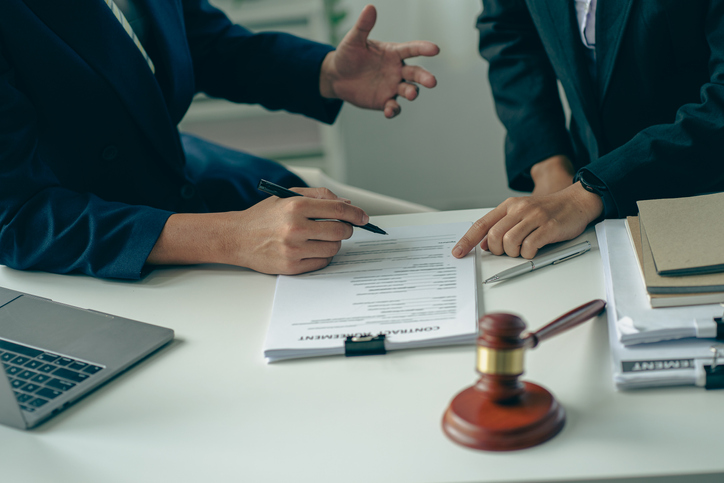If you file for bankruptcy while pursuing a personal injury settlement, it can have a major impact on both cases. Depending on the circumstances of when you file for bankruptcy and receive your settlement, your ability to collect the money and keep it may be in jeopardy. If you’re found to have intentionally failed to disclose your personal injury settlement during a bankruptcy filing, you may even be subject to criminal liability. Personal injury settlement and bankruptcy laws are complex but crucial to understand in order to protect your right to seek and retain the money you may receive in a personal injury case.
Failing to follow proper steps can result in the loss of the right to bring a personal injury lawsuit. At Mitchell, Hoffman & Wolf, we know how overwhelming it can be to pursue a personal injury settlement with looming fears of bankruptcy. We’re here to break down the key facts you need to know about how a personal injury settlement can be impacted by filing for bankruptcy.
Understanding Your Personal Injury Settlement and Bankruptcy
When you file for bankruptcy, you must provide full financial disclosure to the bankruptcy court: your income, expenses, and assets. Assets include anything of value that you own, such as real estate, vehicles, bank and investment accounts, and any personal possessions of value — like jewelry or firearms. A personal injury settlement is also considered an asset and must be disclosed to the Court. If you don’t disclose the personal injury claim to the Bankruptcy Court, it can lead to the dismissal of your personal injury lawsuit.
It’s important to disclose the existence of your bankruptcy case with your personal injury attorney. They will need to disclose the existence of the claim to the defendants and contact your bankruptcy trustee. Once you file bankruptcy, the trustee has control over the decision to settle the case.
Timing Matters
When you’re dealing with a personal injury claim and bankruptcy filing, timing matters. Keep in mind, it’s the date your personal injury claim arose (date of the injury) that courts consider when determining whether it must be disclosed, not the date your settlement is awarded. When your claim arose in relation to your bankruptcy is of top importance, and it plays a key role in whether the claim becomes part of your estate.
Many individuals believe that if they were injured before they filed for bankruptcy and they don’t pursue a personal injury claim until after the bankruptcy process is finalized, they won’t be forced to disclose the settlement as an asset and won’t lose any money to the bankruptcy procedures. As the courts have addressed in recent cases like Barnes v. Lolling, that is not correct. In order to follow the law and lower your risk of losing all your settlement money, you must disclose the claim and inform the bankruptcy court of new assets when you receive your settlement, even if it’s after the closing of your bankruptcy case.
If your personal injury claim arose before you filed for bankruptcy, the claim is considered an asset and must be disclosed when you file for bankruptcy. If you were injured after filing for bankruptcy, whether you need to disclose it depends on which type of bankruptcy you’re filing for. If you’re filing for Chapter 7 bankruptcy, the personal injury claim does not need to be disclosed because it is not considered part of your bankruptcy estate. If you’re filing for Chapter 13 bankruptcy, it must still be disclosed.
When in doubt, always double-check with your lawyer about whether you should disclose your personal injury case when filing for bankruptcy. Likely, your personal injury attorney will begin initial communications by asking you if you’re currently filing, have recently filed, or plan to file for bankruptcy in the future.
Maximize the Settlement Money You Hold Onto
Openly communicating with your personal injury lawyer about the bankruptcy filing will give you the best chance of maximizing the amount of your settlement you hold onto following the bankruptcy process. Illinois bankruptcy law allows debtors to exempt up to $15,000 in personal injury recoveries, and also allows for a wildcard exemption where you can choose to exempt more of your settlement funds so you keep them instead of the bankruptcy court.
Another important consideration is that the larger your personal injury settlement is, the more likely that your settlement can cover the sum of your debt. For example, if you receive a multi-million-dollar personal injury settlement far above the amount of debt you owe, you can use the settlement to pay off that debt and you get to keep the rest. This may prevent you from needing to file for bankruptcy or may allow you to pay off your bankruptcy early with your settlement and keep the rest of your money.
We’re Here to Help
At Mitchell, Hoffman & Wolf, we want you to get the compensation you deserve and keep it, not lose it in bankruptcy proceedings. To get the highest settlement amount and maximize the money you keep from your personal injury claim throughout the bankruptcy process, work with one of our personal injury attorneys, each known for successfully securing multi-million dollar settlements.
We’ll fight hard for you to get the highest settlement you can, and we’ll work with you throughout the process to understand the ways your personal injury claim and bankruptcy claim interact so you can be strategic and secure throughout the litigation process.
Don’t let complex bankruptcy laws cause you to lose out on money from your personal injury settlement. Contact us today for a free initial consultation.

